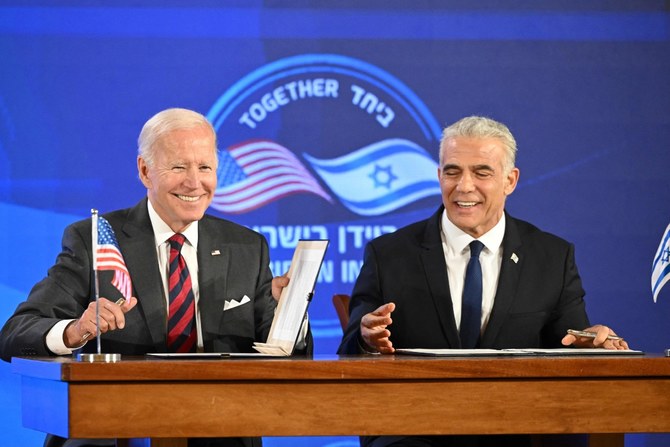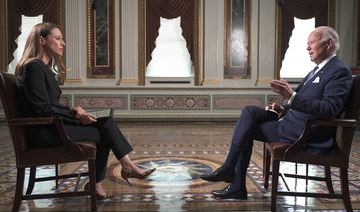JERUSALEM: President Joe Biden and Israeli Prime Minister Yair Lapid on Thursday discussed Iran’s rapidly progressing nuclear program, with the Israeli leader vowing afterward that “there will be no nuclear Iran.”
The US president, who is set to travel to Saudi Arabia on Friday, said he also stressed to Lapid the importance of Israel becoming “totally integrated” in the region.
Their one-on-one talks are the centerpiece of a 48-hour visit by Biden aimed at strengthening already tight relations between the USand Israel. The leaders also issued a joint declaration emphasizing military cooperation and a commitment to preventing Iran, which Israel considers an enemy, from obtaining a nuclear weapon.
“We discussed the Iranian threat,” Lapid told reporters afterward. “There will be no nuclear Iran.”
Israeli officials have sought to use Biden’s first visit to the Middle East as president to underscore that Iran’s nuclear program has progressed too far and e ncourage the Biden administration t o scuttle efforts to revive a 2015 agreement with Iran to limit its development.
Resurrecting the Iran nuclear deal brokered by Barack Obama’s administration and abandoned by Donald Trump in 2018 was a key priority for Biden as he entered office. But administration officials have become increasingly pessimistic about the chances of getting Tehran back into compliance.
In the joint statement, the United States said it is ready to use “all elements of its national power” to prevent Iran from obtaining a nuclear bomb.
Biden, in an interview with Israel’s Channel 12 that aired Wednesday, offered strong assurances of his determination to stop Iran from becoming a nuclear power, saying he’d be willing to use force as a “last resort” if necessary.
Iran announced last week that it has enriched uranium to 60 percent purity, a technical step away from weapons-grade quality.
The joint declaration being announced Thursday could hold important symbolic importance for Biden’s meeting this weekend with Arab leaders in Saudi Arabia as he seeks to strengthen a regionwide alliance against Iran.
“I talked about how important it was … for Israel to be totally integrated in the region,” Biden said after the one-on-one meeting with Lapid.
Thursday’s meeting could also provide a boost to Lapid, who is serving as interim prime minister until elections in November, Israel’s fifth in less than four years. Lapid’s main opponent is the former prime minister, Benjamin Netanyahu, and the joint appearance with Biden could help burnish his credentials as a statesman and leader.
Biden and Lapid also scheduled a joint news conference Thursday and participated in a virtual summit with India and the United Arab Emirates, a collection of countries called the I2U2. The United Arab Emirates announced it will help finance a $2 billion project supporting agriculture in India.
Lapid, 58, is a former journalist and television anchor who entered politics only a decade ago. He served as finance minister under Netanyahu, the country’s longest-serving prime minister, before becoming leader of the opposition and cobbling together a diverse, eight-party coalition ending Netanyahu’s government.
Naftali Bennett became prime minister, with Lapid as his foreign minister. But the coalition collapsed after months of infighting, and Bennett agreed to step aside for Lapid until the election.
Lapid worked hard to solidify his credentials as a statesman while foreign minister. His aides believe the private face time, public appearances and demonstrations of friendship with Biden — who, at 79, is making his 10th trip to Israel — will strengthen that image and get the electorate more comfortable with the idea of Lapid as their leader.
However, Netanyahu is running for prime minister again, and opinion polls have projected that his conservative Likud party will win the most seats in the next election, well ahead of Lapid’s centrist Yesh Atid party.
Neither party is poised to singlehandedly capture the majority of seats needed to form a government, and it is unclear whether either man could cobble together a ruling coalition with smaller parties.
Biden played down the political uncertainty in an interview with Israel’s Channel 12 that aired Wednesday.
“We’re committed to the state, not an individual leader,” he said.
Biden didn’t mention the election during the public portion of Thursday’s meeting with Lapid, but told reporters “we had a good beginning of a long, God willing, relationship.”
Biden is expected to meet only briefly with Netanyahu, with whom who he’s had a rocky relationship in the past.
Much like Lapid, Biden also faces a political threat from his predecessor. Trump, an ally of Netanyahu who still enjoys strong support from Republican voters despite his attempt to overturn the last election, may run for another term.
Asked by Channel 12 if he expected a rematch, Biden replied, “I’m not predicting, but I would not be disappointed.”
Given the US’s status as Israel’s closest and most important ally, Biden is at the center of the country’s attention during his visit.
Israel staged an elaborate welcoming ceremony for him at the Tel Aviv airport, including a red carpet and a band that played the national anthem of both countries. Major television channels set up special live coverage of Biden’s arrival, and even broadcast a nonstop loop of his motorcade traveling on the highway to Jerusalem.
Israel opposed the original nuclear deal, reached under President Obama in 2015, because its limitations on Iran’s nuclear enrichment would expire and the agreement didn’t address Iran’s ballistic missile program or military activities in the region.
Instead of the US reentering the deal, which Trump withdrew from in 2018, Israel would prefer strict sanctions in hopes of leading to a more sweeping accord.
Biden also will receive Israel’s top civilian honor, the presidential medal of honor, from President Isaac Herzog on Thursday.
He’s also scheduled to meet with US athletes participating in the Maccabiah Games. Also known as the “Jewish Olympics,” it’s the country’s largest sporting event and held every four years for Israeli and Jewish athletes from all over world.
Biden says US will use all ‘national power’ to stop Iran atomic bomb
https://arab.news/8bdxc
Biden says US will use all ‘national power’ to stop Iran atomic bomb

- The United States and Israel have separately made veiled statements about possible preemptive war with Iran
- Some Israeli as well as Gulf Arab officials believe the deal’s sanctions relief would provide Iran with far more money to support proxy forces
Davos Panel: How to Lower the Temperature in the Middle East

The ongoing war in Gaza, a delicate ceasefire in Lebanon, a political changeover in Syria and heightened tensions in the Red Sea and Horn of Africa threaten to spill over into a wider regional conflict in the Middle East.
At the same time, the region finds itself caught in the middle of a geoeconomic competition between superpowers.
Jordan’s crown prince meets Bahrain, Kurdistan leaders in Davos

- Crown Prince Hussein seeks to boost cooperation in the region
- Joins session on artificial intelligence, global skills development
DUBAI: Representing King Abdullah at the World Economic Forum in Davos, Crown Prince Hussein bin Abdullah held meetings recently with regional leaders to reinforce Jordan’s commitment to fostering cooperation and addressing pressing challenges in the region.
The crown prince met with Sheikh Isa bin Salman Al-Khalifa, head of Bahrain’s delegation, to discuss ties between the two nations, according to reports.
Their talks focused on enhancing economic and technological cooperation and advancing training programs to help young people prepare for the workplace.
In addition, they reviewed regional developments, stressing the importance of sustaining the Gaza ceasefire and ensuring the delivery of humanitarian aid.
In a separate meeting with Kurdistan Regional Government Prime Minister Masrour Barzani, the discussions focused on relations between Jordan and Iraq.
The officials also spoke about boosting collaboration, especially in economic and technology fields, and addressing key regional issues.
The crown prince also participated in a session on enhancing the skills and productivity of people in the age of artificial intelligence.
The session addressed the WEF’s 2020 initiative to train 1 billion people globally by 2030, which is aimed at closing skill gaps and preparing workers for rapid technological advancements.
The participants at the 55th WEF, held under the theme “Cooperation for the Smart Age,” include heads of state, global CEOs and entrepreneurs, who have gathered to discuss strategies for growth, investing in people, and managing challenges in the energy sector and beyond.
The crown prince was accompanied by Deputy Prime Minister and Minister of Foreign Affairs and Expatriates Ayman Safadi, Jordan’s Ambassador to Switzerland Nawaf Al-Tal, and Director of the Office of the Crown Prince Dr. Zaid Al-Baqain.
Hundreds leave West Bank camp during Israeli raid: Palestinian official

- The Israeli military launched an operation in Jenin on Tuesday, saying it aims to uproot Palestinian militants in the camp and the city.
Jenin: A Palestinian official said hundreds of residents of the occupied West Bank’s Jenin refugee camp were leaving their homes Thursday, days into a large-scale Israeli raid in the area.
“Hundreds of camp residents have begun leaving after the Israeli army, using loudspeakers on drones and military vehicles, ordered them to evacuate the camp,” where Israel’s military launched an intense military operation this week, Jenin governor Kamal Abu Al-Rub told AFP.
The army told AFP that it was “unaware of any evacuation orders for residents in Jenin as of now.”
Salim Saadi, a Jenin resident who lives on the edge of the refugee camp, told AFP that the army had asked camp residents to leave between 9:00 am (0700 GMT) and 5:00 pm.
“There are dozens of camp residents who have begun to leave,” he said.
“The army is in front of my house. They could enter at any moment.”
The Israeli military launched an operation in Jenin on Tuesday, saying it aims to uproot Palestinian militants in the camp and the city.
The offensive began just days after a ceasefire deal paused fighting in the Gaza Strip.
The Israeli assault has killed at least 10 Palestinians and injured 40 more, according to the Ramallah-based Palestinian health ministry.
Israeli Prime Minister Benjamin Netanyahu said that “Operation Iron Wall,” as it has been dubbed, will “eradicate terrorism” in the West Bank city known as a bastion of Palestinian militancy.
Israeli army says killed two Palestinian militants in West Bank

- The Ramallah-based Palestinian health ministry said Israeli authorities had informed it of the deaths of Nazzal, 25, and Shalabi, 30
Ramallah: The Israeli military said Thursday it killed two Palestinian militants overnight near the occupied West Bank city of Jenin, where a large-scale raid is underway, accusing them of murdering three Israelis.
In a statement, the military said that Israeli forces found the two militants barricaded in a house in the village of Burqin.
“After an exchange of fire, they were eliminated by the forces,” it said, adding one soldier was injured in the exchange.
The military identified those killed as Mohammed Nazzal and Qutaiba Shalabi, accusing them of being “affiliated with Islamic Jihad” and responsible for a deadly shooting on an Israeli bus in early January.
The Ramallah-based Palestinian health ministry said Israeli authorities had informed it of the deaths of Nazzal, 25, and Shalabi, 30.
“The bodies are being withheld” by the army, it added in a statement.
Three Israelis were killed and six injured in a January 6 attack near the village of Al-Funduq, also in the West Bank.
Israel’s Defense Minister Israel Katz said at the time he had directed the military to “act with force” to find the attackers, vowing on X that “anyone who... enables or supports the murder and harm of Jews will pay a heavy price.”
The night that followed the attack saw several instances of violent altercations with settlers in that part of the West Bank, including in the village of Hajja, whose mayor told AFP it had come under attack.
Violence has surged throughout the occupied West Bank since the Gaza war erupted on October 7, 2023.
According to the Palestinian health ministry, Israeli troops or settlers have killed at least 850 Palestinians in the West Bank since the conflict began.
During the same period, at least 29 Israelis, including soldiers, have been killed in Palestinian attacks or Israeli military operations in the territory, according to Israeli official figures.
Saudi Arabia condemns Israeli attack on West Bank’s Jenin

- Gunfire, explosions rocked Jenin on Wednesday as Israeli military kept up large-scale raid for second day
- The operation, launched just days after a ceasefire in Gaza, has left at least 10 Palestinians dead
RIYADH: Saudi Arabia has condemned Israeli forces’ attack in the occupied West Bank’s Jenin area, the Saudi Press Agency said early Thursday.
Gunfire and explosions rocked Jenin on Wednesday, an AFP journalist reported, as the Israeli military kept up a large-scale raid for a second day.
The operation, launched just days after a ceasefire paused more than a year of fighting in Gaza, has left at least 10 Palestinians dead, according to Palestinian health authorities.
Israeli officials have said the raid is part of a broader campaign against militants in the West Bank, citing thousands of attack attempts since the Gaza war erupted in October 2023.
“The Kingdom renews its demand for the international community to assume its responsibilities towards halting Israeli violations of relevant international laws and treaties,” a Saudi foreign ministry statement read.
Saudi Arabia warned that the continuation of these violations might cause the fighting and chaos to return to occupied Palestinian territories, thus risking the security and safety of civilians and undermining chances of peace in the region.











